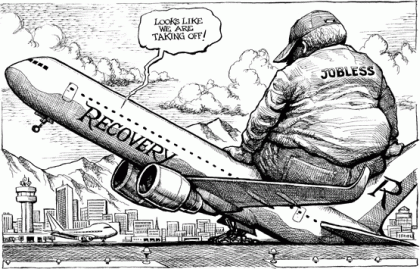
[The Economist, U.K.]
Financial Times Deutschland,
Germany
Banks Must Shrink or it's Disaster Again
"Money
and brains are far more urgently needed elsewhere. … One can't even imagine
what could be done with hundreds of physicists and other highly gifted
individuals, who for years calculated hedge fund risk models that they themselves
barely understood."
By Thomas Fricke

Translated By Stephanie Martin
November 20, 2009
Germany - Financial Times Deutschland - Original
Article (German)
Have you ever wondered why
you’ve never received a million dollar bonus from your boss? (Skip this
question if you’re employed in the financial sector) - even though you’re hard-working,
talented and obedient? Probably not. The answer is obvious. Even in moments of
extreme compassion, most employers wouldn't have so much money, certainly not
for everyone. Rather, the question is why so many banks had that much money
left over and why they have it again - and whether that’s a good thing.
The answer probably goes to the
heart of the crisis and may allow us to assess whether enough is being done to
prevent the next disaster. There’s growing suspicion that the bulk of financial
transactions, which have increased in number to breathtaking levels, are of
little benefit to the rest of the world - even in normal times. And unless banks
shrink back to normal levels, the next crisis isn't far off. Money and brains
are far more urgently needed elsewhere.
INCEST IN THE CREDIT INDUSTRY
Since 1970, the financial
industry’s share of the U.S. economy’s nominal value has doubled from four to
eight percent; and the same goes for its share of wages - pay attention - with an
almost unchanged number of employees, as the Kiel
Institute for the World Economy discovered. This is miraculous. Can bank
employees really have increased their productivity so dramatically?
What sounds just as much like
a fairytale is that, at times, U.S. bank earnings represented more than 40
percent of total corporate profits. Or that over the years, the profits of
financial corporations in the eurozone showed increases of 20 to 30 percent -
as opposed to 10 to 15 percent for the rest of the economy. Or that most
recently, the average compensation in the financial industry, depending on the
country, was 60 to 80 percent higher than compensation in other segments of the
economy - a figure that 30 years ago was a modest 10 percent in the United
States.
All of this has only a
limited connection to the supposedly consumption-crazed average American. An
absurd 80 percent of all loans forgiven by U.S. banks went to banks and other
financial players, according to Dirk Bezemer of the University of Groningen. A
lower level of similarly incestuous financial behavior has been noted in
Germany.
Posted by WORLDMEETS.US
“Reciprocal borrowing accounts
for 40 percent of lending by banks,” says Peter Bofinger, a currency expert and
authority on monetary issues. Is this useful? It's more likely disastrous, as
hinted at by the chain reaction of bank failures during the crisis.
As long as all this hustle
and bustle was still considered wonderful and efficient, the conclusion was:
the more, the better. According to the theory of efficient markets, there would
then be even more talented speculators that would object when rates detached
themselves from real value. And risk would be spread. But here’s the thing: if
this were the case, the bubble and crash wouldn’t have happened. Banks wouldn’t
have been able to make the kind of profits they made for years - because, according
to the textbooks, competition attracts new suppliers and leads to a steady
decline in profits.
In reality, financial markets
follow with frightening frequency the instincts of the herd. And when a bubble
develops and rates increase, the appetite for risk logically increases with the
corresponding increase in profits; which might explain why greater volume
increases rather than decreases profitability. According to calculations by Heiner Flassbeck,
chief economist at the United Nations Conference on Trade and Development, completely
different exchange rates around the globe move in the same direction day after
day, sometimes for months - the Brazilian Real with the price of oil or the
Australian Dollar with the U.S. stock market.
That’s difficult to reconcile with presumed fundamental efficiency. According
to Flassbeck, “It’s a mess.”
This may further explain why financial
transactions impel one another to such heights and decouple from the real
economy - why interbank lending in 2007 accounted for almost six times U.S.
economic performance.
It's at that point, however, that
the rule of "more is better" reverses itself. Then, the larger the
herd, the more interest rates inexplicably shoot over the top. According to
estimates by New York economist Thomas Philippon, 30 to 50 percent of U.S.
financial industry salaries can be traced to excesses that cannot be explained
by the supposedly more complex financing needs of IT companies. According to the Kiel economists, profits
were based increasingly on "socially unproductive activities.”
Posted by WORLDMEETS.US
If that is the case, then it
would be better for everyone if the structure of the financial industry shrank.
Then the size of bubbles would also shrink - and there would be no money for
inexplicable bonuses. And there’s more: Thanks to this miraculous compensation,
Kiel researcher Dirk Dohse says that 60 percent of students graduating from
elite U.S. universities enter the financial industry. That's rather absurd if most
of what's done there inflates business profits and salaries in a mathematically
complicated way, but is of little use to humanity and in the end, brings on
global economic crises.
One can't even imagine what could
be done with hundreds of physicists and other highly gifted individuals, who for
years calculated hedge fund risk models that they themselves barely understood
- from the accelerated development of flu vaccines to solar power plants in the
desert to a detailed economic plan for the Free
Democratic Party.
And banks could again focus
on having friendly staff giving loans to people who want to invest in something
that makes sense.
*Adjustment after the
Crisis - Will the Financial Sector Shrink? Bickenbach et al., Kiel Policy
Brief, October 2009. Thomas Fricke is chief economist with the FTD.
CLICK HERE FOR GERMAN VERSION
Posted by WORLDMEETS.US, Dec. 3, 5:09am